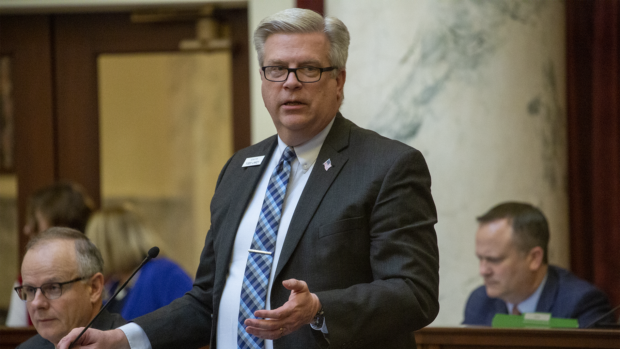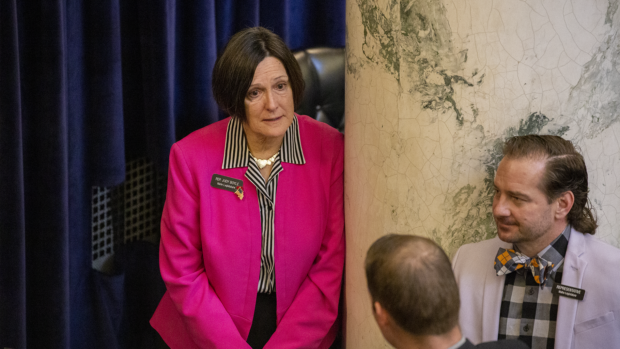A legislative task force took its first look Wednesday at higher ed diversity, equity and inclusion programs — resuming a discussion that is likely to spill into the 2025 session.
DEI has already been a perennial, roiling issue at the Statehouse. Colleges and universities are banned from using taxpayer dollars on DEI programs — that language has been part of the higher ed budget for two years — and a 2024 law bans written diversity statements in higher ed hiring or admissions. The eight-member task force didn’t talk about any specific bills during its 90-minute inaugural meeting.
But that could come later.

Legislative leadership has given the House-Senate group the green light to work on “potential” legislation, co-chair Sen. Todd Lakey, R-Nampa, reminded the task force Wednesday.
What legislation might look like — and what the task force might agree on — is harder to handicap.
Hardline conservatives hold a majority on the committee. On Wednesday, several conservatives said they were worried that regional accreditors are working DEI principles into the standards they use to judge Idaho colleges and universities.
Rep. Barbara Ehardt, R-Idaho Falls, restated her concerns about campus DEI programs. DEI, she said, could be used as a “reverse weapon” that discriminates against some students.
Sen. Melissa Wintrow of Boise, the lone Democrat on the task force, said the group needs to start with a clear understanding of what equity really means. Without it, she said, lawmakers might simply embark on a series of “word searches” to root out programs and courses that sound objectionable.
“I feel like we’re bordering on censorship,” said Wintrow, who has worked in higher education for more than 30 years.
The task force will next meet on Dec. 2.
What the task force learned Wednesday
Lawmakers spent much of Wednesday morning hearing an overview of DEI’s presence on Idaho campuses — and context about the national debate.
Here’s a rundown of what Legislative Services Office researchers presented Wednesday.
DEI-related courses — and degree requirements. This discussion focused on a required undergraduate course at Boise State University: “University Foundations 200: Foundations of Ethics and Diversity.”
All students must complete a UF 200 course — but this year, they can choose from a menu of 58 different classes. Options fall under a wide range of topics, from social inequality to borders and migration to graphic novels.
The UF 200 course has long been on lawmakers’ radar. Boise State suspended UF 200 in 2021, after an unnamed legislator reported hearing that students had been harassed in class over their beliefs. An independent investigation found no evidence of wrongdoing.

Still, UF 200 remains a sore point for parents and some students, said task force co-chair Rep, Judy Boyle, R-Midvale. “That’s the (class) I hear a lot of complaints about.”
But after Wednesday’s meeting, State Board of Education Executive Director Joshua Whitworth told reporters that the Boise State course was unfairly singled out.
All four four-year schools submitted reports to legislative staff, outlining their DEI-related courses. No other school identified a single course that is required for all students, but they all identified various course offerings that fall under a DEI rubric. At the University of Idaho, for example, students must complete one course to meet an “American Diversity” degree requirement.
Diversity statements in hiring. Senate Bill 1274, which bans required diversity statements in campus hiring, became law on July 1.
Legislative researchers looked at recent higher ed job listings — including some posted before July 1 — and found only a few positions with a potential diversity statement requirement:
- Boise State: 13 postings reviewed. One had a potential diversity statement requirement.
- U of I: 17 postings reviewed. Seven had a potential diversity statement requirement.
- Idaho State University: 15 postings reviewed. Two had a potential diversity statement requirement.
- Lewis-Clark State College: 27 postings reviewed. None required a diversity statement.
Legislative staff looked again at higher ed job postings Tuesday, and found none requiring a diversity statement, LSO Principal Research Analyst Casey Hartwig told lawmakers.
The DEI debate nationally. Since 2020, the debate over campus social justice programs has swept across state capitols.
Seventeen states, including Idaho, have passed laws limiting DEI. But 10 states have passed bills supporting DEI.
Executive orders have also been split. Five governors have acted to restrict DEI, while nine governors have issued orders defending DEI. Idaho Gov. Brad Little has issued no orders on the issue.
Not surprisingly, the laws and executive orders have cut across partisan lines. Republican-led states have moved to rein in DEI programs, while Democrat-led states have sought to protect them, Hartwig said.
